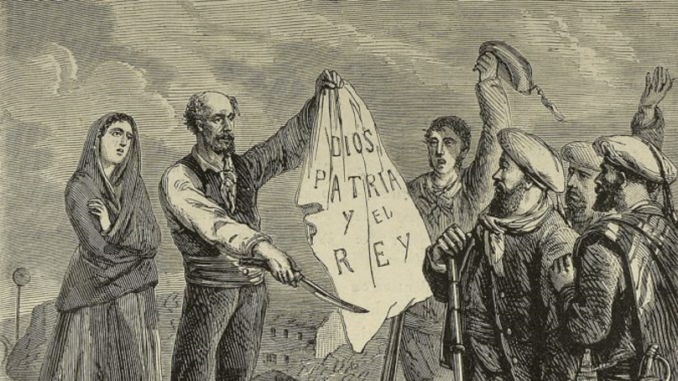
We suggest reading this article published in issue 22310 of PENSAMIENTO NAVARRO on May 25, 1971. Its author is Francisco Canals Vidal.
***
[…] We are interested in asking ourselves the question, of full validity for the present and the future of Spain, and in order to give a more full understanding of its political history, as to the «traditionalist» definition of the social and political act of Carlism, and the «Carlist» concreteness of Spanish traditionalism.
Let us try to confront the question with a decisive return to the things themselves while avoiding getting bogged down in distorting verbiage.
Everyone sees that men like Donoso Cortés in his second period deserve to be described as eminent traditionalist thinkers. Currently, French, Belgian, and even American traditionalist writers exert universal influence.
This does not imply in any way that a political action with an intention and content similar to that carried out in Spain by the Carlist people would be possible today in France or in the United States of America. Nor that Donoso Cortés could do something similar in Spain under Isabel II nor in France where his brilliant «Essay» burst forth.
The term «traditionalist» signifies a system of sociological and political thought. This term can even signify not only a doctrine of politics, but also a practical attitude towards political life.
With the caveats that must always be made about terms that end with the suffix «ism» —in the liturgy of the Mass, no one would understand if the creed, the profession of Christian and Catholic faith, were to be substituted by an act of adhesion to Christianist and Catholicist principles— it can be accepted that the term has its own potency. Personally, I affirm myself to be a traditionalist and I understand this as characterizing both a doctrine and an attitude.
For this very reason, traditionalist thought would be incomplete, mutilated in the strictest sense of the term, if it did not reach conclusions based on concrete judgments about the historical and current life of society.
In Spain, a traditionalist who defined himself thematically and intentionally as a non-Carlist would be comparable to an Irishman who at the end of the Seventeenth Century would have defined himself as a lover of his country and a Roman Catholic but also as an «Orangeman». This attitude would have evidently allowed him to keep his properties and offices; but it is obvious that it would not have been conducive to the perseverance of his nation in the Catholic faith and in its Irish authenticity. A «Carlist» who professed to be a «non-traditionalist» would be comparable to a Protestant «Jacobite» Irishman. The Protestant «Jacobites», in any of the countries that would come to form the United Kingdom, would have had no efficacy whatsoever.
We have desired to allude to these historical examples in order to make what we want to say intuitable in the concrete and singular, and to which it will be convenient to return to repeatedly: that Spanish traditionalism without Carlism moves in the order of a consideration of the essence without its existence, out of desire to flee from the concrete and the singular.
Thus, «traditionalism» belongs to the order of speculative-practical knowledge, and not to that of political life. But what is active and efficient is not the essence nor the knowledge of the essence, but rather the being of things, which political rationalism often forgets. Although perhaps, this traditionalism of principles and essences is precisely, on the concrete and political level, no longer a rationalism, but a castrated disfigurement and a betrayal.
«Traditionalism» of itself signifies the essence and content of the Carlist act. «Carlism» denotes the Spanish struggle for tradition in its historical and social concreteness. A non-traditional Carlism is, by the same token, a meaningless act. A Spanish traditionalism indifferent to Carlism is a concept without deeds. A system of concepts without the force and efficacy of what it is.
Translated by Alférez M. Scullin, Círculo Camino Real de Tejas




Deje el primer comentario